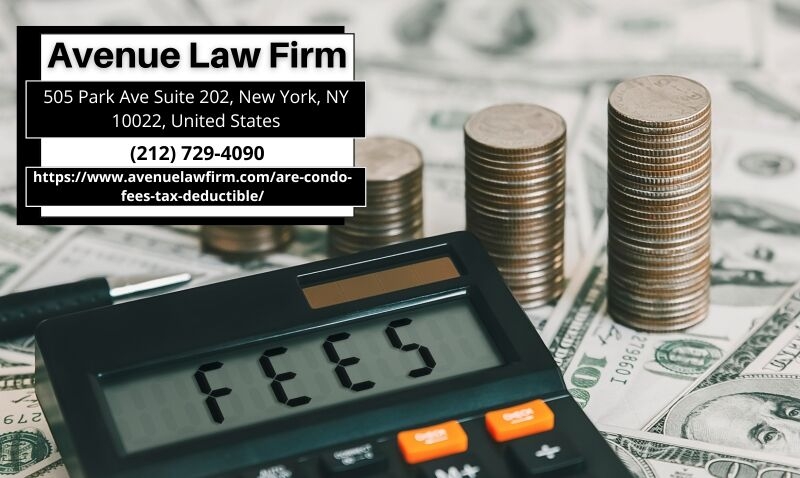Understanding the tax implications of condo fees is a critical issue for property owners in New York City. In a new blog post titled “Are Condo Fees Tax Deductible?”, NYC condo real estate attorney Peter Zinkovetsky, Esq. (https://www.avenuelawfirm.com/are-condo-fees-tax-deductible/) offers practical insight into how these common charges are classified and whether they offer any tax benefits to property owners. Representing Avenue Law Firm, Peter Zinkovetsky, Esq. outlines how understanding these costs can support better financial planning for those invested in NYC condominiums.
NYC condo real estate attorney Peter Zinkovetsky, Esq. begins by clarifying the purpose and nature of condo fees, often known as common charges. These are regular expenses that cover services like building maintenance, shared amenities, and staff salaries. Unlike property taxes, which may be deductible and go toward public services, condo fees are considered private expenses. As such, they typically do not qualify for federal tax deductions for primary residences. “Common charges are considered personal living expenses, similar to utility bills or home maintenance costs,” Zinkovetsky explains in the blog post.
Peter Zinkovetsky, Esq., an NYC condo real estate attorney, continues by distinguishing common charges from similar costs like HOA fees and property taxes. He explains that condo fees are based on factors such as unit size, location, and amenities. A larger unit or one located in a high-demand area like Manhattan will often carry higher fees. Zinkovetsky notes that while these charges may feel burdensome, they reflect the real costs of maintaining a condominium’s shared infrastructure and services.
The article further explores exceptions to the general rule. Condo fees may become tax-deductible under specific conditions. For instance, if a condo is used as a rental property, owners may deduct fees related to maintenance and operations that support rental income. According to Peter Zinkovetsky, Esq., “When you rent out your condo, you’re running a business, and your condo fees are a part of your operating costs.” These expenses can be reported on IRS Schedule E as part of the rental income deduction process.
For those who use part of their condo for business purposes, such as a home office, Zinkovetsky explains that a proportional deduction may also apply. In these scenarios, condo fees can be split between personal and business use, allowing some tax benefit. This allocation requires accurate record-keeping and often the support of a tax advisor to comply with federal regulations.
The blog post also tackles the issue of special assessments, which are temporary fee increases levied to cover specific building projects. Peter Zinkovetsky, Esq. clarifies that not all special assessments qualify for deductions. If the assessment is for routine maintenance, it may be deductible in the year it is paid. However, if the funds are used for capital improvements like installing a new roof, the cost must be depreciated over a 27.5-year period for rental properties.
NYC condo real estate attorney Peter Zinkovetsky, Esq. also explains how the tax treatment of these fees differs between personal residences and rental units. In the case of short-term rentals, deductions may be limited depending on the number of days the property is rented versus personal use. If the condo is rented for fewer than 15 days in a year and used for personal purposes the rest of the time, none of the associated expenses, including condo fees, can be deducted.
Another important point raised in the article is the contrast between real estate taxes and condo fees. Real estate taxes are handled separately from common charges and are paid directly to the local tax authority. Because they fund public infrastructure and services, they are more likely to be eligible for tax deductions, subject to limitations like the State and Local Tax (SALT) cap. Condo fees, by contrast, support the private operation of the condominium and are not treated the same by the IRS.
Throughout the article, Peter Zinkovetsky, Esq. emphasizes the importance of staying informed and actively involved in a building’s financial planning. He encourages condo owners to attend board meetings, monitor special assessments, and consult with professionals for tax planning. His practical approach reflects the mission of Avenue Law Firm to help clients make well-informed decisions about their properties.
Staying informed about condo fees and their tax implications can make a meaningful difference in long-term financial planning. Understanding what qualifies as deductible, how to properly allocate expenses, and the impact of local NYC rules helps condo owners reduce tax liability and protect their investments.
For condo owners navigating the financial aspects of New York City real estate, consulting with Peter Zinkovetsky, Esq. at Avenue Law Firm offers a clearer path to managing common charges, property taxes, and potential deductions.
About Avenue Law Firm:
Avenue Law Firm is a New York City-based legal team with extensive experience handling real estate matters including condo purchases, sales, and ownership. Led by attorneys like Peter Zinkovetsky, Esq., the firm provides legal guidance for condo owners looking to better understand the costs and responsibilities associated with property ownership in NYC.
Embeds:
Youtube Video: https://www.youtube.com/watch?v=sDKcMDsz5Ac
GMB: https://www.google.com/maps?cid=14223199020890935024
Email and website
Email: peter@avenuelawfirm.com
Website: https://avenuelawfirm.com/
Media Contact
Company Name: Avenue Law Firm
Contact Person: Peter Zinkovetsky
Email: Send Email
Phone: (212) 729-4090
Address:505 Park Ave Suite 202
City: New York
State: New York 10022
Country: United States
Website: https://avenuelawfirm.com/







